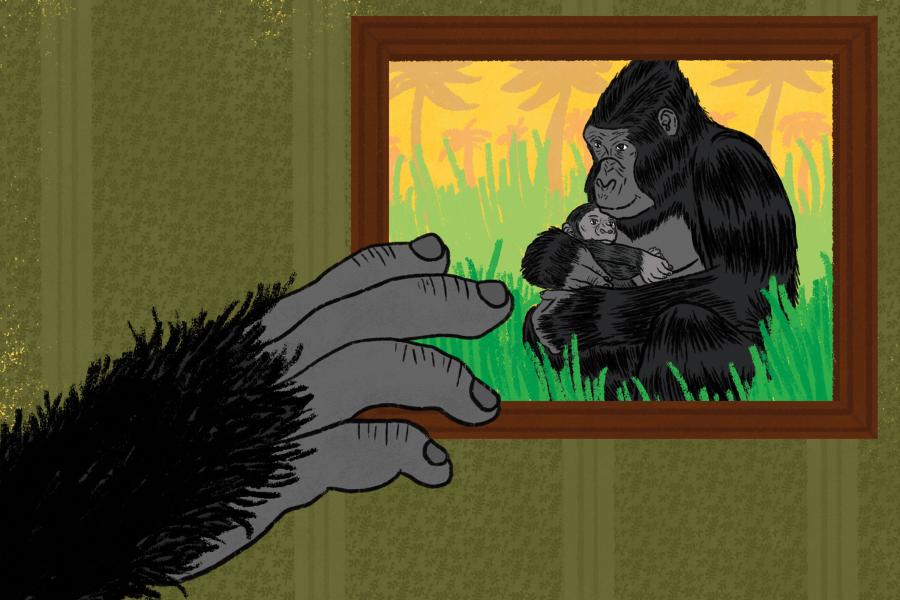While traveling between zoos and animal sanctuaries around the world to study chimpanzees and bonobos, Christopher Krupenye started getting the distinct impression that the apes remembered him—in some cases, even after years had passed since his last visit. But it took seeing an ape react to a fellow researcher to convince Krupenye to scientifically follow through on his hunch.
Krupenye was conducting research at Zoo Leipzig in Germany when his colleague came back to visit for the first time in several years. Krupenye watched as a male bonobo named Jasongo—whom Krupenye's colleague had worked with years prior on a frequent basis—clearly seemed to recognize his former human acquaintance. "Jasongo was on the opposite side of the enclosure, but he raced over to my colleague and me," says Krupenye, a Johns Hopkins assistant professor of psychological and brain sciences. For an ape accustomed to having hundreds of thousands of people filter past his enclosure every year, the reaction was unusual. "He stayed with us for a long time playing," Krupenye recalls, "as though he was excited to reconnect with someone he had known for a while."
In a new study in Proceedings of the National Academy of Sciences, Krupenye's hypothesis has been borne out. Using eye-tracking technology, his team observed that chimpanzees and bonobos spent significantly longer looking at photos of fellow apes they once knew than looking at pictures of ape strangers. This evidence of remembering past groupmates remarkably extends back 26 years, setting a record for the longest-lasting social memory ever demonstrated outside of humans.
The findings offer new insights into the evolutionary origins of human social memory and, because of it, our capacity to maintain formal and informal relationships over long timescales and distances with seldom-seen people.
"Because apes live these deeply social lives full of important friendships and alliances, we naturally expected some evidence of rich, long-term memories of past social partners," says Krupenye, who directs the university's Social & Cognitive Origins group. "But we were very surprised by the longevity of their social memory."
Krupenye and colleagues further report that chimpanzees and bonobos also seem to remember something about the quality of their former social interactions. Apes stared longer at those individuals with whom they shared the most positive relationships, possibly akin to seeing long-lost friends.
"When the apes pay greater attention to pictures of their former pals, we don't know if they're able to daydream about past experiences or whether they feel particular emotions," Krupenye says. "Yet there is something in their mind that already allows them to differentiate individual apes."
For the study, the researchers, including doctoral student Laura Lewis, visited with a total of 26 chimpanzees and bonobos at Edinburgh Zoo in Scotland, Planckendael Zoo in Belgium, and Kumamoto Sanctuary in Japan. They first gathered images of apes that had either left the zoo or died at least nine months prior. They also inquired with zookeepers about the relationships the apes had with the pictured individuals.
To encourage apes to participate in the study, the researchers placed a juice dispenser directly in front of a computer screen outfitted with an eye-tracking apparatus. While the primates contentedly sipped away, a screen displayed side-by-side images of fellow apes, with only one of the apes known to the study participant. The eye-tracking device recorded the apes' gaze intervals for each image.
The results showed that the apes spent more time looking at familiar primates and the most time overall looking at close associates, despite years of not having encountered one another. The most striking example of this behavior came from a bonobo named Louise. Over the course of eight trials, Louise paid particularly close attention to pictures of her sister Loretta and her nephew Erin, neither of whom she'd seen in 26 years.
Given that chimpanzees and bonobos typically live in captivity between 40 and 60 years, Krupenye says the results suggest apes can recall individuals over the majority of their lives. "We now have evidence of memories going back over a quarter-century, and we don't have evidence they can't remember for even longer," Krupenye says.
Also see
The study's research angle dovetails with the Krupenye lab's efforts on comparative cognition, a field that explores the origins and mechanisms of thought, knowledge, and other mental activity across different species. In addition to humans and other apes, the researchers in his lab work with pet dogs brought to JHU's Homewood campus by their owners to play cognitive games. Learning more about this particular animal group that has long adapted to living alongside humans can offer novel insights into not only canine cognition but Homo sapiens mentation as well.
The new study involving chimps and bonobos, which together represent our closest living animal relatives, is even more instructive. The findings point to the last common ancestor of those apes and the primates that later evolved into humans—an unknown hominid that lived 6 million to 9 million years ago—possessing a capacity for decadeslong social memory. This ability, the study authors assert, flourished further in humans as we went on to develop unique forms of cooperative interaction. For example, enduring memory likely proved critical for the emergence of intergroup trade, which dates back at least 500,000 years and has dramatically influenced global societies in more recent millennia.
The research additionally highlights the profound similarities between chimpanzees, bonobos, and us humans—a truth that Krupenye says takes on heightened urgency given the threat posed to these endangered creatures by deforestation and hunting. "Acknowledging how fascinating and similar to us these species are should inspire conservation efforts to keep them around."
Posted in Science+Technology








